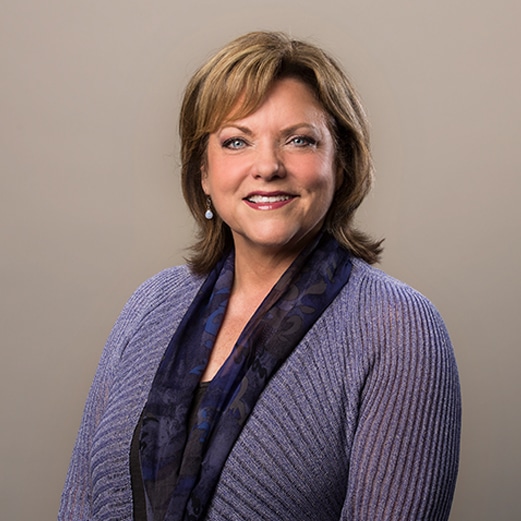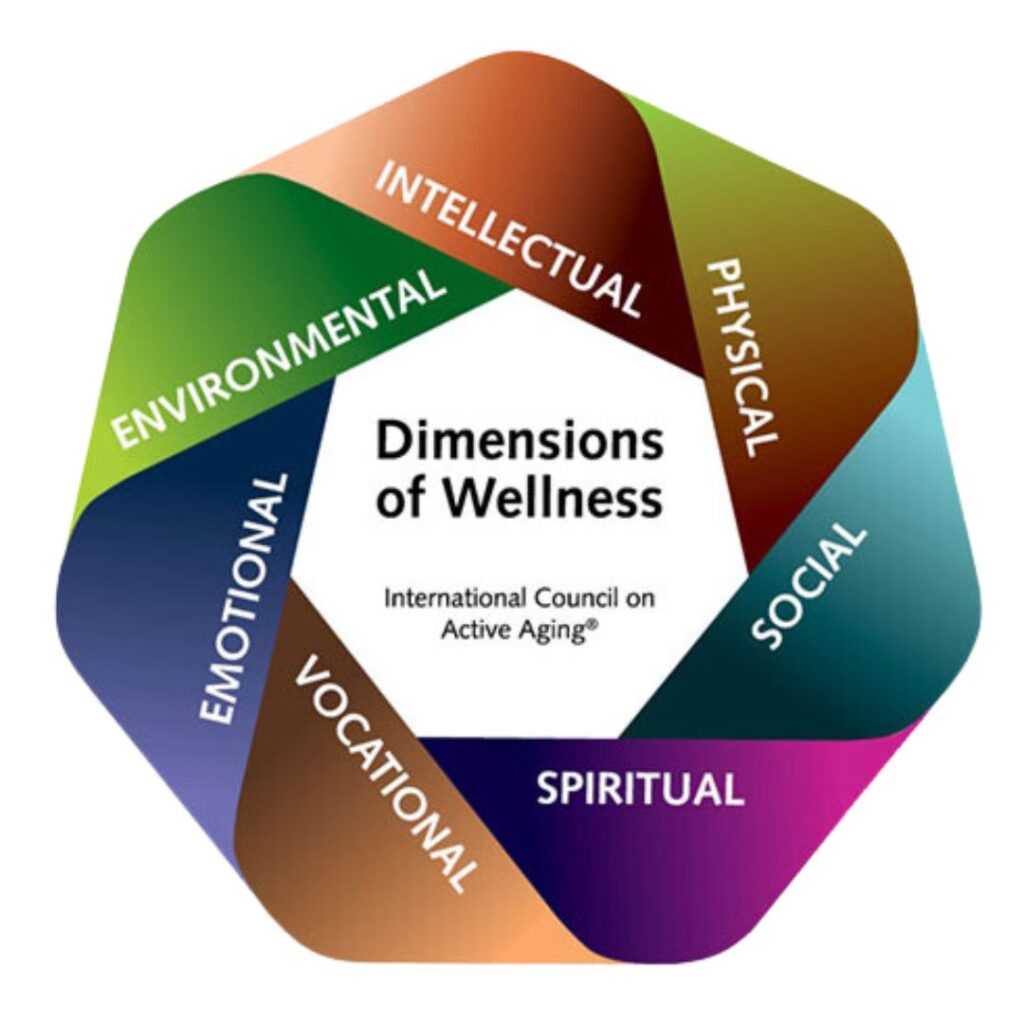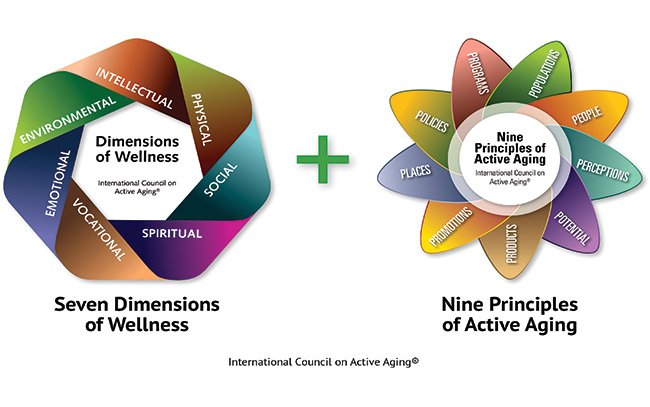7 Pillars of Wellness | CC Young
CC YOUNG
For more information about the author, click to view their website: CC Young Senior Living
Jan 26, 2024
Texas - Dallas, Collin, SE Denton & Rockwall Counties
Email US
Click to Email UsJanuary 1, 2024 | Jen Griffin, Vice President of Engagement | CC Young Senior Living

by Jen Griffin, Vice President of Engagement
In my article in December’s Lifestyle Guide, I shared my profound paradigm shift about “wellness.” The shift went from viewing wellness in a physical context to recognizing that wellness is really multifaceted in nature. It is not one dimensional! This shift has driven our theme for 2024. As a result, the Community Outreach Team has adopted the International Council on Active Aging’s 7 Pillars of Wellness serve as our guide for activities and special events in 2024. All year long, we will focus on balance within these specific areas of life: intellectual, physical, social, spiritual, vocational, emotional, and environmental. The theme for the year is “Go for the Gold in 2024!”
You may ask: What does that mean? Well, to me, “go for the gold” means “continue to reach”- for whatever you want! If you are exploring all pillars of wellness, the sky is the limit. As Norman Vincent Peale once said, “Shoot for the moon. Even if you miss, you will land among the stars!” I believe “shooting for the moon” is a mindset and a journey. It’s a way of life with mindful attention to balance.
Let’s face it: Nobody’s perfect. I am The Worst about balance in my life, but I’m inspired to be better. And like Vince Lombardi said, “If we chase perfection, we can catch excellence.” Personally, aiming in the right direction would be improvement!

So…with that in mind, what excites me most about this new paradigm of wellness? It is that almost everything we already do at CC Young is related to wellness – and therefore to these 7 pillars! To help you along so you can “see” what I mean, this month you will be able to identify the individual pillars in our revamped Lifestyle Guide. There will be a guide on each page so you can start to learn how we are categorizing each event. I hope you will eventually be able to recognize the pillars and mentally chart your course for balanced participation in all the pillars. It will be easy seek balance because we have so many options each month!
Let’s break down the pillars in more detail. (“Here we go” – a la Dak Prescott…)
Physical Wellness: This pillar is familiar to many—it’s about the importance of regular exercise, nutritious eating, and adequate rest. However, it’s not just about the body; it’s about feeling vibrant and energized in our physical being.
Intellectual Wellness: This means stimulating our minds through lifelong learning, exploring new ideas, and engaging in creative endeavors. Intellectual wellness fuels our curiosity and keeps our mental faculties sharp.
Emotional Wellness: This is about understanding, expressing, and managing emotions in a healthy way. This pillar teaches us resilience, self-compassion, and the ability to navigate life’s ups and downs.
Social Wellness: This one is about nurturing meaningful connections and fostering a sense of belonging within our communities – both here on campus and elsewhere. Social wellness thrives on genuine relationships and a supportive network…wherever that may be!
Spiritual Wellness: The key to this is reflecting on life’s purpose, finding inner peace, and seeking meaning and depth in our existence. Spiritual wellness is about aligning with our values and beliefs.
Vocational Wellness: Sometimes a little mysterious by just the word, this one is about finding satisfaction and fulfillment in our work or personal pursuits. This pillar encourages us to pursue careers or hobbies that resonate with our passions and strengths.
Environmental Wellness: Finally, hopefully we will all continue being mindful of our surroundings and making choices that positively impact our environment. Environmental wellness emphasizes our responsibility to care for our planet.
As we navigate 2024, “Go for the Gold!” serves as a rallying call for each of us to broaden our horizons. It prompts us to ponder: What can we do differently this year to fortify our wellness – not just for 2024, but also for the years beyond? Our collective journey toward wellness isn’t merely about reaching a destination but rather embracing a [mindful] lifestyle—a way of living that nurtures every facet of our existence. It’s about fostering a community where each individual is empowered to thrive intellectually, physically, socially, spiritually, vocationally, emotionally, and environmentally. Doesn’t that sound like a good path for all of us?
As we embark on this journey together, let’s seize the opportunities ahead, explore new horizons, foster deeper connections, and immerse ourselves in diverse experiences. Let’s champion our wellness, individually and collectively, and in doing so, paint a canvas of vibrant and fulfilled lives at CC Young.
I am jazzed about the transformations that await us as we “Go for the Gold” in 2024 and beyond. Can you tell?
- To view the original version of this article visit www.ccyoung.org/news/village-report-january-2024/
- Seniors Blue Book was not involved in the creation of this content.
Other Articles You May Like
Food Bank of the Rockies Nourishing Communities on the Western Slope
Of the 32 counties we support in Colorado, 13 are located west of the Continental Divide and served by our phenomenal team in Grand Junction. Through mobile pantries and partnerships with more than 110 Hunger Relief Partners in this region, our team is able to meet the specific needs of these communities and bring food where it is needed most. We know that budgets can be stretched thin these days, so by leveraging the power of community and through programs like Everyday Eats for Older Adults, Food for Kids, mobile pantries, and more, Food Bank of the Rockies provides food to 1 in 9 people facing hunger in Colorado.Need a referral to your local food pantry? Do you want to apply for SNAP benefits? Want to learn more about our programs? Interested in volunteering or making a donation? We would love to hear from you! To contact us, please call 970-464-1138 or 877-953-3937 (toll-free) or visit foodbankrockies.org. Editors Note: This article was submitted by Food Bank of the Rockies. For more information, please call 303-371-9250.
Understanding ADLs and IADLs: Keys to Pennsylvanias Medicaid HCBS Programs
Pennsylvania offers Medicaid waiver programs under the Community HealthChoices (CHC) umbrella and the Pennsylvania Department of Aging (PDA) Waiver (often referred to as the PA Council on Aging Waiver). These programs help older adults and individuals with physical disabilities remain in their homes or community settings instead of entering nursing facilities. CHC and the PDA Waiver provide long-term services and supports (LTSS) based on assessed functional needs, emphasizing assistance with ADLs and IADLs. Covered services may include personal care assistance, adult day services, home-delivered meals, transportation, home modifications, assistive technology, and respite care for family caregivers. In addition, Pennsylvanias CHC Waiver offers Participant-Directed Services that allow participants to hire and manage their own caregivers, including family members. To qualify, applicants must be Medicaid-eligible, at least 60 years old (for PDA Waiver) or 21+ (for CHC), and require a nursing facility level of care as determined through a standardized functional assessment of ADLs/IADLs. In this article, we explain what Activities of Daily Living (ADLs) and Instrumental Activities of Daily Living (IADLs) are and how needing help with these tasks is central to qualifying for Pennsylvanias Medicaid waivers like CHC and the PDA Waiver.What Are ADLs (Activities of Daily Living)?Activities of Daily Living (ADLs) are fundamental self-care tasks that a person must perform daily to maintain independence. Difficulty with ADLs often signals a need for supportive services. Core ADLs include: Mobility (Ambulating/Transferring): Safely walking, getting up from a chair, or transferring from a bed to a wheelchair. Dressing: Selecting and putting on appropriate clothing (including handling fasteners) without assistance. Eating: Feeding oneselfusing utensils to get food from a plate to the mouth and consuming it. Personal Hygiene: Bathing or showering and performing grooming activities like shaving, brushing teeth, and combing hair on ones own. Toileting (Continence): Independently using the toiletgetting to the toilet, transferring on and off, and cleaning oneself afterward. When someone can no longer perform several ADLs without help, it indicates that ongoing care or support is likely needed.What Are IADLs (Instrumental Activities of Daily Living)?Instrumental Activities of Daily Living (IADLs) are more complex tasks that allow a person to live independently in the community. While not necessarily performed daily, they are essential for managing ones household and life. Key IADLs include: Shopping for Essentials: The ability to shop for groceries, pick up prescriptions, or purchase clothing and other necessities. Meal Preparation: Planning and cooking mealsgathering ingredients and safely using kitchen appliances. Housekeeping: Keeping the home clean and livable tasks like cleaning, laundry, and taking out the trash. Money Management: Handling finances, such as paying bills on time, managing bank accounts, and budgeting. Transportation: Getting around or arranging transportationdriving oneself or using public transit or rides to run errands and attend appointments. Medication Management: Managing and taking medications properly remembering to take the correct medicines at scheduled times and refilling prescriptions. Communication: Using the phone or computer to communicatelooking up phone numbers, making calls, sending emails, and staying in touch with others. Trouble with IADLs is often one of the first signs that someone needs more support, even if basic ADLs are unaffected.Why ADLs and IADLs Matter for Medicaid Waiver EligibilityIn Pennsylvania, needing help with ADLs and IADLs is a central eligibility criterion for the CHC and PDA Waiver programs. These waivers serve individuals who would otherwise qualify for nursing facility care but prefer to remain in their own homes or community settings. Eligibility is determined through both financial and functional assessments. The functional assessment evaluates whether an individual requires hands-on assistance with ADLs and/or significant help with IADLs, thereby meeting a nursing facility level of care. Pennsylvania uses standardized toolsoften the Pennsylvania LongTerm Care Assessment System (PaLTAS) or the Minimum Data SetHome Care (MDSHC)to score independence in ADLs and IADLs.During the functional evaluation, an assessor reviews abilities such as transferring from bed to chair, walking safely, eating, toileting, meal preparation, housekeeping, medication management, and managing money. Cognitive issuessuch as memory problems due to dementiaare also considered since they impact daily functioning. If an individual cannot perform multiple ADLs without assistance or has significant deficits in IADLs, they are likely to meet the level-of-care requirement and become eligible for waiver services.Community HealthChoices (CHC) WaiverCommunity HealthChoices (CHC) is Pennsylvanias comprehensive HCBS waiver program for individuals aged 21 and older who require a nursing facility level of care. Administered by the Office of Long-Term Living (OLTL), CHC is a managed care program that combines physical health, long-term services and supports, and pharmacy benefits under a single plan (with behavioral health carved out). To qualify for CHC: Be age 21 or older. Meet Medicaid financial eligibility guidelines. Require a nursing facility level of care (confirmed through functional assessment). Live in a setting that meets HCBS requirements (e.g., home, apartment, assisted living). Be a Pennsylvania resident. Once enrolled, participants receive a comprehensive package of services tailored to their needs. Covered services may include personal assistance, home-delivered meals, adult day services, behavioral support, professional nursing, home modifications, assistive technology, transportation, and respite care. CHC also offers Participant-Directed Services, allowing participants to recruit, hire, train, and supervise their own caregiversoften family membersto assist with ADLs (bathing, dressing, toileting) and IADLs (meal preparation, medication reminders).PDA Waiver (Council on Aging Waiver)The Pennsylvania Department of Aging (PDA) Waiver, also called the Council on Aging Waiver, serves seniors aged 60 and over who require nursing facility level of care but choose to remain at home or in other community-based settings like domiciliary care homes. To qualify: Be age 60 or older. Meet Medicaid financial eligibility requirements. Be assessed as requiring nursing facility level of care (through the functional assessment). Live in a qualifying community setting. Covered services under the PDA Waiver may include personal care assistance, home-delivered meals, homemaker services, personal emergency response systems, respite care, adult day services, minor home modifications, and transportation. Like CHC, the PDA Waiver emphasizes managing ADL and IADL needs to keep participants safely in their homes.Participant-Directed ServicesBoth CHC and the PDA Waiver offer Participant-Directed Services, which empower participants to choose and manage their own caregivers, including family members, friends, or neighbors. Under this model, participants develop a service plan with guidance from a care coordinator, set schedules, and handle payroll tasks. This flexibility helps ensure that personal care and IADL support align with participants preferences and routines.Signs That Your Loved One May QualifyBelow are practical indicators that someone may be eligible for Pennsylvanias CHC or PDA Waiver due to difficulty with ADLs and IADLs: Trouble with Personal Care: Skipping showers, unkempt hair, or wearing dirty clothes may indicate difficulties with bathing and dressing (ADLs). Malnutrition or Weight Loss: An empty fridge or significant weight loss suggests issues with meal prep or feeding oneself (ADLs/IADLs). Mobility Decline and Falls: Struggling to walk without assistance, needing help to stand, or experiencing frequent falls signals reduced mobility (ADL: transferring/ambulating). Medication Errors and Memory Problems: Missing doses, mixing up pills, or forgetting appointments point to challenges with medication management and scheduling (IADLs). Household Neglect: Piles of mail, unpaid bills, or a cluttered home reflect trouble with housekeeping and money management (IADLs). A combination of needing help with several ADLslike bathing and toiletingand difficulties with IADLssuch as meal prep and housekeepingstrongly indicates a nursing facility level of care. Document these challenges for the functional assessment to demonstrate eligibility.Were Here to Help: Next Steps and Contact InformationNavigating Pennsylvanias Medicaid waiver programs can be complex, but you dont have to go it alone. At Passion to Care, we specialize in guiding Pennsylvania families through the CHC and PDA Waiver application processesfrom the initial functional assessment of ADLs and IADLs to completing paperwork and coordinating services once approved. If you notice your loved one struggling with daily tasks or if a professional has recommended nursing facility care, it may be time to explore CHC or the PDA Waiver. Our compassionate, family-first team ensures your loved ones needs are met with dignity and respect. Call us or contact us today to learn how to get started with Pennsylvanias Medicaid waivers for home and community-based services.
Local Services By This Author
CC Young Skilled Nursing
Skilled Nursing 4847 West Lawther Dr., Dallas, Texas, 75214Our five-star CMS rated community is comprised of caring experts who help you or your loved one live life to the fullest. We invite you to visit The Vista and our Skilled Nursing, Long-Term Care, Respite, and Rehabilitation/Aquatics Center.
Home Healthcare by CC Young
Home Health 4847 W Lawther Dr, Dallas, Texas, 75214Helping You Gain Strength & Confidence - Do you need healthcare as prescribed by your doctor after receiving a diagnosis, or after surgery, rehab or stroke? Our Home Healthcare offers skilled services - all delivered by our compassionate and experienced team. We offer Home Healthcare wherever a senior calls home.
CC Young Assisted Living
Assisted Living 4847 W Lawther Dr, Dallas, Texas, 75214The Assisted Living team at CC Young is committed to creating the optimal balance between your individual needs and the way you want to live. This dedication reflects our founders mission to provide support and care for seniors with an unwavering compassionate spirit. The CC Young Life Enrichment team offers residents a full calendar of activities and outings that engage the mind and encourage socialization. Choose from two distinctive residences and floorplans in The Hillside and The Vista to flourish in body, mind and spirit.




